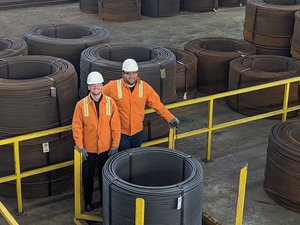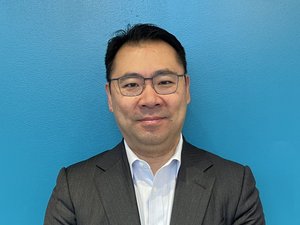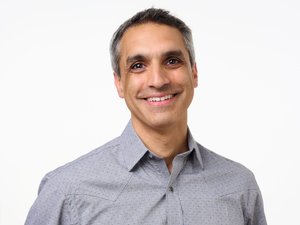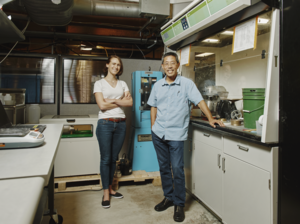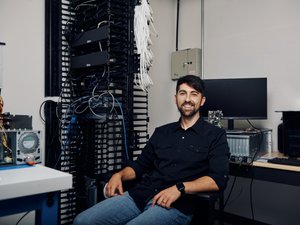Not many are doing it like Bolt, the Boston-based VC firm that focuses on early-stage hardware startups. In just over two years, the firm has invested in 26 companies, raised a second fund of around $40 million, opened a San Francisco branch and formed a partnership with Y Combinator, drawing West Coast tech interest in Boston hardware expertise.
What Bolt does is unlike most VC firms out there: It provides engineering and product design support for all of its portfolio companies, many of which work out of Bolt's Boston and San Francisco facilities for free until they're ready to move into their own space.
So when you consider the investment Bolt makes in its companies, it's not just the actual seed funding that makes an impact. It's also Bolt's staff of engineers, designers and other specialists, along with the millions of dollars in prototyping equipment at both facilities, that provides a value sometimes greater than the seed capital itself.
The person instrumental behind Bolt's engineering and design clout is Ben Einstein, the VC firm's managing partner and co-founder who has spent years helping Fortune 500 companies and small startups bring products to market. His two general partners are Scott Miller, former VP of engineering at iRobot, and Axel Bichara, a former partner in Atlas Venture's tech practice (now Accomplice).
For Einstein, the new wave of hardware companies that have popped up over the last year have the potential to be more profitable than software companies, and he points to the success of FitBit and GoPro as examples. In FitBit's most recent quarterly earnings, the company reported $51.3 million in profit for Q2, nearly double from the year before.
With FitBit's $8.5 billion exit and GoPro's $6.7 billion exit, they are among a growing number of successful hardware companies that are encouraging more investors to get in the game.
As detailed in a blog entry written by Bolt associate Chris Quintero, the number of funding rounds for venture-backed hardware startups that have raised at least $1 million has gone from around 20 in 2010 to more than 200 last year. Within the same period, the amount of funding into these startups has increased from under $500 million to nearly $3.5 billion.
"It’s pretty amazing to look at the numbers," Einstein said. "A lot of people are really surprised and the average investor doesn't understand that hardware startups are a thing and can be profitable."
"The average investor doesn't understand that hardware startups are a thing and can be profitable."
What has made this new wave of hardware startups viable cost-wise is two-fold, Einstein said. For one, more and more companies are deciding to use contract manufacturers instead of building their own plants. Perhaps even more importantly, the growing popularity of smartphones over the last decade has dramatically decreased the cost of various hardware components, like screens and wi-fi censors, while also increasing their complexity and sophistication.
Before the proliferation of smartphones, was "incredibly hard to build a screen or wi-fi module from scratch," Einstein said. "Now it's easy because you can just buy it."
The underlying factor for any hardware company's appeal is the very physicality of the product itself, Einstein said. He said it's ultimately easier for someone to put money down for a tangible object than it is to buy something that is just a bunch of code.
"It’s very fundamental human psychology," Einstein said. "I agonize over every dollar I spend on Spotify, and I’ll turn around literally that day and spend $50 on bottled water, t-shirts and all sorts of crazy stuff."
What makes hardware startups work
Einstein said this new wave of hardware startups are different from hardware companies of the past because most of them focus on building a razor-razorblade business model that brings in recurring revenue.
"It's the idea that you sell something once and you keep engaging the customer over and over again," Einstein said, citing Keurig's coffee pods and Kindle's ebooks as two examples.
It's these kind of connected hardware products that are the focus of Bolt's investment strategy.
"It's the idea that you sell something once and you keep engaging the customer over and over again."
One of the firm's most recent investments was a $1.4 million seed round it led for EverCharge, a San Francisco-based startup that provides a smart electric vehicle charger for multi-tenant properties, where electric vehicle charging has typically been a tricky endeavor. EverCharge makes money by charging for the installation of the charger and then a monthly fee for the service.
Joseph Nagle, EverCharge's director of marketing, said EverCharge's Hardware-as-a-Service model is what can help the startup bring in revenue faster than more traditional hardware companies.
"Once you look at the costs for manufacturing and what the going rate is, it doesn’t make sense to make your profit on the manufacturing and selling of the hardware because you’re going to have to sell so many units," he said. "The subscription model makes more sense. We don’t make as much money off the charging unit, but over time our profit margin grows and grows."
Engineering support makes a world of difference
Bolt's Boston location at 110 Chauncy St. is divided into two floors, with the first floor mostly consisting of open office space and conference rooms and the basement serving as the prototyping lab. The lab has an impressive array of equipment for prototyping, ranging from 3D printers and a laser cutter to a CNC machine and an environmental test chamber.
Beyond the prototyping equipment, Bolt's most valuable asset is its team. In addition to Einstein and his general partners, Bolt has its own staff working in engineering, design, operations and marketing. Without the help they provide Bolt's portfolio companies, many of them say wouldn't made as nearly as much progress.
When I spoke to Jonathan Fraser, director of hardware for DipJar, he recalled the times when Bolt's team provided help that was integral to the capital-intensive development and production of the startup's connected tipping device that accepts credit cards.
"If I didn't have enough time to write some of the code that goes into DipJar, they have an engineer on staff here that spent basically a month of his own time here in the office and said, 'OK, I'll write a lot of the code that needs to go in there,' so it wasn't just him giving me advice, he was actually writing it, doing the work, so that sort of engineer time is super valuable," Fraser said.
"It completely dwarfs the money that they give," he added.
